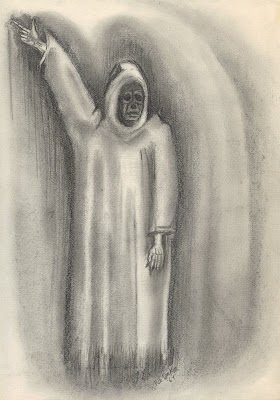
From a tape transcription of Thelonious Monk theorizing on the subject of aquatic mammals:
“They say if you can ever make a tape of a porpoise and play it back, down slow enough, it’s the same as the human voice. They are so close to the human species. Because they have the same box here [pointing to his throat].” After explaining that they communicate at very high frequencies, Monk performs a pretty convincing imitation of a porpoise cry. He then launches into a lecture about how man might benefit from harnessing the porpoise’s ability to sense everything around them: “You know, it’s an amazing thing to study the porpoises. With the study of the porpoise, they going to find out possibilities of completely obliterating a blind man’s stick. Walk down the fucking street blind as a bat, and naked. They’ll put a little sonar thing in his ear or something that is able to tell when you’re getting up to anything, the kind of object, the texture of the object, whether it’s a building or a person…it could tell that it’s either a hard surface or cloth. Because they’ve checked out porpoises and they can’t figure out, they hadn’t been able to figure out why a porpoise can swim in dark, murky waters, so you can’t see nothing at all, and they won’t hit a motherfucking thing.”
“They say if you can ever make a tape of a porpoise and play it back, down slow enough, it’s the same as the human voice. They are so close to the human species. Because they have the same box here [pointing to his throat].” After explaining that they communicate at very high frequencies, Monk performs a pretty convincing imitation of a porpoise cry. He then launches into a lecture about how man might benefit from harnessing the porpoise’s ability to sense everything around them: “You know, it’s an amazing thing to study the porpoises. With the study of the porpoise, they going to find out possibilities of completely obliterating a blind man’s stick. Walk down the fucking street blind as a bat, and naked. They’ll put a little sonar thing in his ear or something that is able to tell when you’re getting up to anything, the kind of object, the texture of the object, whether it’s a building or a person…it could tell that it’s either a hard surface or cloth. Because they’ve checked out porpoises and they can’t figure out, they hadn’t been able to figure out why a porpoise can swim in dark, murky waters, so you can’t see nothing at all, and they won’t hit a motherfucking thing.”
~ Robin D. G. Kelley, Thelonious Monk: the Life and Times of an American Original
X
Monk plays for the porpoises: Blue Monk, Oslo 1966: Charley Rouse, tenor; Larry Gales, bass; Ben Riley, drums.
X
Monk plays for the porpoises: Blue Monk, Oslo 1966: Charley Rouse, tenor; Larry Gales, bass; Ben Riley, drums.
X
Note: If you ever doubted that the piano is actually a percussion instrument, this performance will disabuse you of that doubt.
Note on the illustration: Torn many years ago from an issue of Oui magazine, the picture is of scientist John C. Lilly and friend. Lilly's well-publicized research into the intelligence of aquatic mammals was most likely the inspiration of Monk's rap as quoted above.
X








